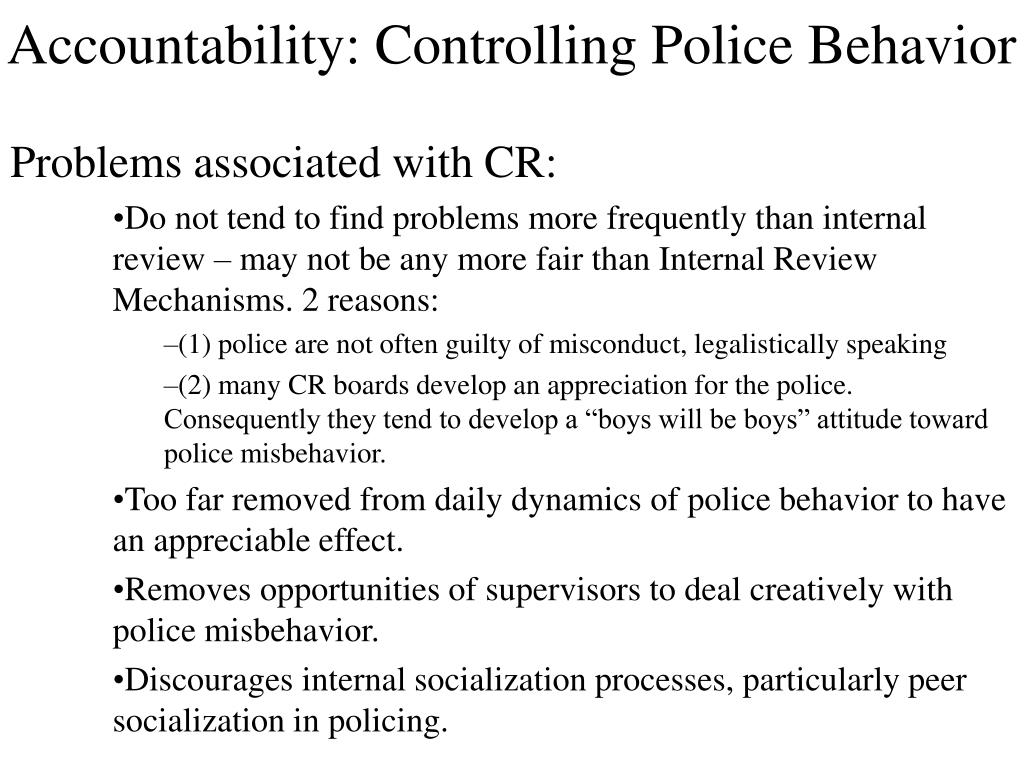Concerns Mount Over Police Accountability Review Process

Table of Contents
Public trust in law enforcement is significantly impacted by the perceived effectiveness of police accountability mechanisms. Across the nation, concerns are mounting over the slow pace, lack of transparency, and ultimately, the perceived inadequacy of the processes designed to hold police officers accountable for misconduct. This article delves into the key issues fueling this growing distrust and explores potential solutions for improving police accountability review processes.
Lack of Transparency and Public Access to Information
The lack of transparency surrounding police misconduct investigations is a major contributor to public distrust. Many investigations remain shrouded in secrecy, hindering public understanding and fueling cynicism about the fairness and effectiveness of the system. This lack of access to information undermines the very foundation of police accountability.
Limited Public Disclosure of Investigations
Many police departments severely restrict the release of information regarding complaints filed against officers. This lack of transparency creates a fertile ground for speculation and mistrust.
- Lack of readily available information on complaints filed: The public often has no way of knowing how many complaints are filed against officers, or the nature of those complaints.
- Delayed or withheld release of investigative reports: Even when investigations are completed, the reports are often delayed or completely withheld from the public, making it impossible to assess the thoroughness and fairness of the process.
- Limited access to disciplinary actions taken against officers: The public rarely learns about the consequences officers face for misconduct, preventing any meaningful assessment of the effectiveness of disciplinary measures.
- Use of vague language in public statements obfuscating details: Official statements often use vague language that avoids specifics, making it difficult to understand the nature and extent of the misconduct.
Need for Independent Oversight
Internal affairs investigations are frequently viewed with skepticism, as they are often perceived as biased in favor of protecting the department rather than seeking justice. The solution lies in establishing independent oversight bodies.
- Internal affairs investigations are often perceived as biased: Officers investigating their colleagues may be hesitant to uncover or report misconduct, leading to incomplete or compromised investigations.
- Independent bodies offer impartiality and public accountability: Independent review boards or commissions can provide impartial investigations and ensure greater accountability.
- Examples of successful independent oversight models in other jurisdictions: Several jurisdictions have successfully implemented independent oversight models, demonstrating their effectiveness in increasing transparency and improving public trust. Studying and adopting best practices from these models is crucial.
Ineffective Sanctions and Punishments
Even when misconduct is discovered, the sanctions imposed are often insufficient to deter future wrongdoing. Weak disciplinary measures send a message that police officers can act with impunity, further eroding public trust.
Weak Disciplinary Measures
Current penalties often fail to reflect the severity of the misconduct, leading to a perception that the system is not taking accountability seriously.
- Insufficiently harsh penalties for serious offenses: Minor reprimands or short suspensions are inadequate for serious offenses like excessive force or racial profiling.
- Lack of consistency in disciplinary actions: Similar offenses can result in vastly different punishments depending on the officer, department, or even the jurisdiction.
- Prevalence of "revolving door" justice: Officers accused of misconduct are often able to transfer to other departments, escaping accountability for their actions. This undermines the entire system of police accountability.
Lack of Accountability for Systemic Issues
The current system often fails to address underlying systemic issues that contribute to police misconduct. Focusing solely on individual instances ignores the broader context.
- Insufficient focus on training and cultural change within departments: Comprehensive training programs that address issues like implicit bias and de-escalation techniques are essential.
- Lack of mechanisms to address patterns of misconduct: When multiple officers in a department exhibit similar patterns of misconduct, it points to systemic problems that need to be addressed.
- Need for data-driven analysis of complaints and trends: Analyzing complaint data can identify patterns and trends, informing departmental reforms and training initiatives.
Lengthy and Inefficient Investigation Processes
The lengthy and often inefficient nature of investigations further exacerbates the problem. Delays erode public trust and allow time for evidence to disappear or memories to fade.
Excessive Delays in Investigations
Delays create a sense of injustice and undermine the credibility of the entire accountability process.
- Backlogs of complaints awaiting investigation: Many departments struggle with backlogs of complaints, leading to significant delays.
- Insufficient resources allocated to investigation units: Understaffing and under-resourcing of investigation units contribute to delays.
- Complex procedures leading to delays: Bureaucratic complexities and overly cumbersome procedures can significantly prolong the investigation process.
Lack of Timely Resolution and Communication
The lack of timely updates and communication leaves victims and the public feeling unheard and ignored.
- Need for regular updates to complainants: Victims and the public deserve regular updates on the progress of their complaints.
- Improved communication strategies to enhance transparency: Clear and consistent communication is essential for fostering trust.
- Clear timelines for investigation completion and resolution: Establishing realistic timelines for investigations and providing clear communication about those timelines is crucial.
Conclusion
The current police accountability review process is plagued by issues of transparency, ineffective sanctions, and lengthy delays. These flaws significantly undermine public trust and fail to adequately address police misconduct. The system urgently needs reform to ensure accountability and restore faith in law enforcement.
Call to Action: Demand better. Advocate for meaningful reforms to the police accountability review process. Demand increased transparency, stronger sanctions, independent oversight, and a more efficient system. Your voice matters in ensuring a fair and just system of police accountability. #PoliceAccountabilityReform #JusticeForAll

Featured Posts
-
 Schneider Electric Launches Global Ai Partner Ecosystem For Ai Growth
Apr 30, 2025
Schneider Electric Launches Global Ai Partner Ecosystem For Ai Growth
Apr 30, 2025 -
 4 Takeaways How Derrick White Led The Celtics To Victory Against The Cavaliers
Apr 30, 2025
4 Takeaways How Derrick White Led The Celtics To Victory Against The Cavaliers
Apr 30, 2025 -
 Impact Of A Minority Government On The Canadian Dollars Value
Apr 30, 2025
Impact Of A Minority Government On The Canadian Dollars Value
Apr 30, 2025 -
 Vilniaus Savo Vardo Turnyras Matas Buzelis Renkasi Tyla
Apr 30, 2025
Vilniaus Savo Vardo Turnyras Matas Buzelis Renkasi Tyla
Apr 30, 2025 -
 Ofcom Complaint Filed Over Chris Kabas Panorama Coverage A Police Watchdogs Action
Apr 30, 2025
Ofcom Complaint Filed Over Chris Kabas Panorama Coverage A Police Watchdogs Action
Apr 30, 2025
